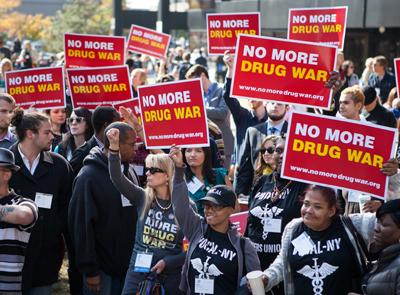Stop Philadelphia mayor’s new war on drugs
 As was predicted when Mayor Cherelle Parker was elected, her “War on Drugs” has touched and ravaged the Kensington section of Philadelphia again. Parker’s rhetoric, and that of her allies in the so-called “Kensington Caucus” — City Council members Quetcy Lozada, Mark Squilla, Mike Driscoll and Jim Harrity — led to a violent and repulsive attack on the community of houseless and drug-using people of Kensington in early February.
As was predicted when Mayor Cherelle Parker was elected, her “War on Drugs” has touched and ravaged the Kensington section of Philadelphia again. Parker’s rhetoric, and that of her allies in the so-called “Kensington Caucus” — City Council members Quetcy Lozada, Mark Squilla, Mike Driscoll and Jim Harrity — led to a violent and repulsive attack on the community of houseless and drug-using people of Kensington in early February.
In order to fulfill their promises to the anti-addict, anti-houseless forces in the region and the developers intent on gentrifying Kensington, they had both plainclothes and uniformed officers of the Philadelphia Police Department and agents of the Drug Enforcement Administration (DEA) outfitted in military garb engage in a paramilitary raid the neighborhood. The mayor and the Kensington Caucus claimed they were not behind the raids, but it matches and aligns with their rhetoric exactly. Officially, Pennsylvania Attorney General Michelle Henry’s office took credit for the raids.
The drug dealers who were arrested had their product seized by the DEA and the users in the area were forced into compulsory substance use treatment or threatened with incarceration. This path of action against drug addiction and problematic substance use is fairly warned against, as studies have shown that compulsory treatment is not only unhelpful, but actually harmful.
‘Blatantly inhumane escalation of police violence’
An analysis of several studies from across the world shows that forced treatment doesn’t actually improve outcomes for addicts and problematic users. In fact, it noted that human rights abuses can occur in forced treatment. As the Philadelphia Coalition for Dignity in Treatment said in a statement, this policy of forced treatment will accelerate the loss of life. “This is a blatantly inhumane escalation of police violence against drug users, who already face high levels of criminalization and violence at the hand of the state.”
A majority of states in the United States have some type of law that would force addicts and problematic users into treatment, sometimes using outdated or dangerous treatment models. No specific treatment model will help everyone all the time; there needs to be a consideration of the human needs and social positioning of the person being forced into treatment.
The new mayor and the Kensington Caucus members truly do not care about the drug addicts they are subjecting to abuse. When Kensington community members contacted the 24th Police Precinct to ask where people being put into treatment were going or if they had been arrested, police told them not to waste time tracking them down. One officer said, “They’ll be right back out on the street within a day, anyways.”
Compulsory treatment no solution
Compulsory treatment has the opposite effect that people pushing it would think: It can cause people to go into a state of overdose when they return to using. Tolerance while in treatment drops and they don’t realize it so they use again and overdose on their usual dose.
Policymakers who want to create a solution to the drug problem need to realize that people don’t stop using drugs when they’re forced to. They stop when they’re ready to stop. Either policymakers like the members of the Kensington Caucus do not understand this, or they are only looking for points from their political support bases, especially the gentrifiers, so they ignore it.
Everyone touched by drug addiction or problematic drug use needs to push back against this anti-worker, anti-user, anti-houseless wave of actions. We have to push the fact that only voluntary treatment will work and that threatening jail over not going is a cruel attack on the bodily autonomy of people who use drugs.
Tell Attorney General Henry, Mayor Cherelle Parker and the Kensington Caucus that we will not tolerate these attacks on people who use drugs. Tell them that the only way to solve the drug problem is via a progressive harm reduction model!

